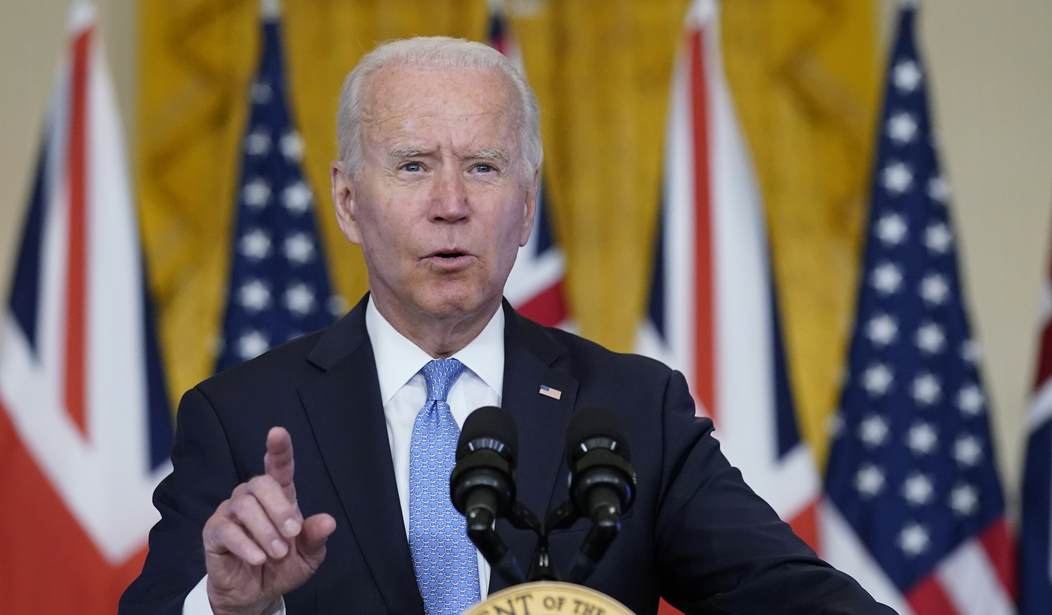It’s a climbdown, but perhaps not as much as it appears. The Biden administration pushed hard for months to require financial institutions to report any annual transfers above $600 to the IRS, part of an effort to fund Joe Biden’s social-engineering programs by capturing tax evasion by the wealthy. The White House never explained how the wealthy get rich $600 at a time, while they also couldn’t explain why such transactions were the government’s business outside of normal income reporting to the IRS.
Late yesterday, the Treasury Department retreated … a little:
The Biden administration on Tuesday backed down on a controversial proposal to direct the IRS to collect additional data on every bank account that sees more than $600 in annual transactions, after widespread criticism from Republican lawmakers and banking industry representatives, who said the tax enforcement strategy represented a breach of privacy by the federal government.
Instead, the administration and Senate Democrats are proposing to raise the threshold to accounts with more than $10,000 in annual transactions, and any income received through a paycheck from which federal taxes are automatically deducted will not be subject to the reporting. Recipients of federal benefits like unemployment and Social Security would also be exempt.
The IRS would collect the total sum of deposits and withdrawals from bank accounts with more than $10,000 in non-payroll income. Information on individual transactions would not be collected.
Just how much of a retreat is this, though? One does not need to be especially wealthy to move $10,000 in a year, even without counting income reported through other channels. For instance, if consumers pay their bills through credit cards and then use direct-bank transactions to cover those costs, that will add up to $10,000 rather quickly.
Sen. Mike Crapo (R-ID) pointed out yesterday that average Americans run a lot more through their bank accounts than the new proposed target:
“Today’s new proposal reflects the administration’s strong belief that we should zero in on those at the top of the income scale who don’t pay the taxes they owe, while protecting American workers by setting the bank-account threshold at $10,000 and providing an exemption for wage earners like teachers and firefighters,” Treasury Secretary Janet Yellen said in a statement.
But the overhauls haven’t persuaded Senate Republicans. “The average American runs $61,000 through their account,” Sen. Mike Crapo of Idaho said Tuesday. “The average American will be picked up by this plan.”
That raises lots of questions. not the least about capacity at the IRS. If they have to deal with this firehose of data, what resources will they have to effectively parse through it and find a few false notes? Biden wants to hire more IRS personnel as part of this plan, but they might need to double or triple their current staffing levels just to use this much data effectively, let alone drill down to the wealthy evaders this supposedly will uncover.
Besides, how many tax cheats would that annual threshold actually catch, and at what level? If Biden and his team want to argue for increased scrutiny of the wealthy, then shouldn’t they target numbers that actually look like wealth rather than normal-level transactions for average American families? If billionaires built their wealth on annual transactions at this level in order to avoid taxes, it would take them one hundred thousand years to do it.
On top of that, there are privacy concerns arising from a plan to give the government even greater access to individuals’ financial records than they already have. Plus, as the CEO of the American Bankers Association points out, it will raise compliance costs for banks that will only favor the already Too Big to Fail institutions:
Rob Nichols, president and CEO of American Bankers Association, was also unconvinced. “Even with the modifications announced today, this proposal still goes too far by forcing financial institutions to share with the IRS private financial data from millions of customers not suspected of cheating on their taxes,” he said.
The proposal will still raise “privacy concerns, increase tax-preparation costs for individuals and small businesses, and create significant operational challenges, particularly for community banks,” he said.
Do we really need more consolidation in the banking industry? If not, why are we about to raise compliance costs through the roof for smaller banks? Even assuming that the privacy issues are resolvable, setting the threshold this low strongly suggests that the Biden administration is less interested in finding tax evasion than it is in sticking its nose into everyone’s literal business. It’s a bad idea at practically any level.
Update: There has been some misconceptions about this on Twitter. First, this isn’t the same reporting requirement that the IRS imposes on individual cash transactions at $10,000 or more. That’s been in place for decades. This new requirement requires banks to report all accounts that have $10,000 in aggregate non-income transfers for a whole year, which as Crapo points out, includes practically everyone.
As for the argument that not all income goes through channels that report to the IRS, that’s true enough. However, what this rule would do in practice is to allow the government to search everyone’s records without any sort of probable cause to suspect a crime has been committed. It’s a grotesque affront to the Fourth and Fifth Amendments.








Join the conversation as a VIP Member